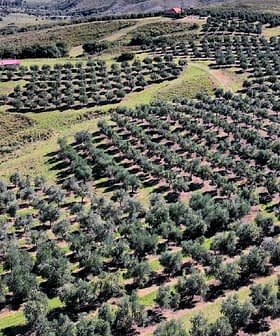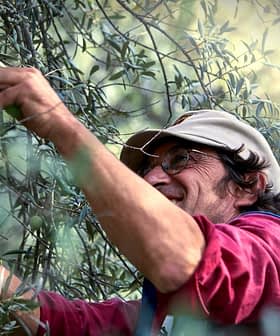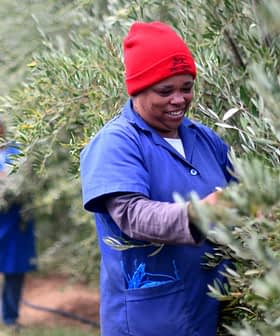After Slow Start, South African Producers Celebrate Record Harvest
While many growers reported more rainfall and record harvests, others fared less well and worry about the future.
 De Rustica
De Rustica When South African producers started harvesting in late February, the yield was not expected to surpass last year’s total.
However, the 2021 harvest is now on par with 2020, in which 1.5 million liters of extra virgin olive oil were produced, and some are calling it a record harvest.
Last year, our harvest was quite poor due to several difficult environmental factors. In contrast, we are blown away by the results this year.
Vittoria Jooste, manager of the South African Olive Industry Association (SA Olive), originally estimated the yield would reach 1.36 million liters, but has since revised her estimate.
“[The harvest is] broadly in line with last year,” she told Olive Oil Times. “Our current estimate for the 2021 harvest is 1.6 million liters of olive oil.”
See Also:Bountiful Harvest Yields Wins for South African Producers at World CompetitionJooste added that 113 extra virgin olive oils have been entered into the SA Olive Awards, which “is a good indication of the quality of the 2021 South African extra virgin olive oils.”
Nick Wilkinson, who co-owns the Rio Largo Olive Estate with his wife, Brenda, in the Western Cape province’s Scherpenheuwel Valley, said they had an “excellent harvest in both quantity and quality.”
“The crop is three times higher than last year’s crop and our best ever, some 30 percent higher than the long-term average before the drought,” he said. “We have finally recovered from the last four years of poor rainfall with a record crop, despite the challenges of load shedding [a South African term for power cuts] and Covid-19 distancing requirements.”
“We suffered electricity outages due to the national supplier having regular shutdowns, which meant production had to stop during these times, which made for a nightmare in planning to ensure all olives harvested were processed timeously [in a timely manner],” Wilkinson added.
Earlier this year, Wilkinson told Olive Oil Times the power cuts had forced them to invest in backup generators, which had “a material effect on costs of production.”
Wilkinson said the harvest took longer than usual as they were limited in terms of labor numbers to keep proper separation and hygiene protocols in place, which slowed down their rate of picking each day.
He also noted the national increase of farmworkers’ wages on March 1 as a concern.
“Government saw fit to increase our wage rates by over 16 percent, while inflation is around four percent, coupled with a 15 percent increase in electricity rates – add power outages to this,” Wilkinson said. “The increased quantity does not offset the increased cost of production, so profitability is again challenged when compared to the major European producers, who continue to enjoy financial support and subsidies.”
“Our quality profile will again hopefully determine that we sell well, and at least sell at better-than-average prices,” he added.
Philip King, manager of nearby Mardouw Olive Estate, between Swellendam and Ashton, told Olive Oil Times that his team is celebrating a successful harvest.
“We followed last year’s record harvest up with an above-average harvest, so we are extremely happy,” King said.
Even though the drought in the west of the country ended last year, King was still concerned about low rainfall earlier this year. As a result, the team at Mardouw started harvesting slightly later than usual.
“Rainfall was an issue leading up to the harvest, but it came at the right time, and we managed to pull it through,” he said.
Deeper inland, De Rustica Olive Oil Estate, situated in the semi-arid Klein Karoo, “had its best harvest yet,” marketing manager Precilla Steenkamp told Olive Oil Times.
“With Covid-19 restrictions and the drought in the Klein Karoo, we produced over 200,000 liters of top-quality extra virgin olive oil,” she said. “Last year, our harvest was quite poor due to several difficult environmental factors. In contrast, we are blown away by the results this year.”
See Also:The Best Olive Oils from South Africa“The Klein Karoo is currently experiencing a long drought and obviously this has an impact on our water infrastructure,” Steenkamp added. “Despite this, we managed to ensure that all our groves received optimal watering.”
She said a new challenge they faced was running out of tank space to store their recently produced oils, but added this is “a challenge we hope to experience every year as we go from strength to strength.”
Steenkamp said although they had to adhere to Covid-19 safety regulations to safeguard their staff, the harvest at De Rustica went ahead without “too much disruption.”
“It took a little longer than it would normally have taken, but we are extremely pleased with the results,” she said.
Even though the safety regulations were not that disruptive, Steenkamp said the country’s lockdown restrictions “definitely had an impact on the sales and the logistics of transportation of orders within our business.”
Unlike other olive farms, Goedgedacht, a farm-based community support organization located near Riebeek-Kasteel in the Swartland region north of Cape Town, reported a substandard outcome.
“Sadly our harvest this year was very poor,” Rob Templeton, the managing director of Goedgedacht, told Olive Oil Times. “It was primarily due to the drought conditions that have prevailed for the last four seasons, making olive farming extremely difficult.”
“We did not have enough water in our dams to support the trees during pit hardening and these stressful conditions led us to lose a significant amount of fruit,” he added. “Luckily, with good winter rains this year, we have sufficient water to help support a better harvest for the 2022 harvest season.”
“We are in the process of converting our entire olive farming operations to organic, and the team has a renewed focus on achieving this objective,” he added.
Templeton said the Goedgedacht team was not affected by Covid-19 restrictions due to their reduced harvest volume.
“But Covid-19 caused chaos for our conference center on the farm and we lost many bookings, including 40 schools from the United Kingdom that booked to visit us late last year,” he said.
Added to the poor harvest outcome, Templeton expressed concern about the demand for Goedgedacht’s product.
“This year, restaurants have resumed operations in South Africa, which in turn has slowed sales in retail,” he said. “Consumers are now watching their spending very carefully, so specialty food items have seen a noticeable drop in sales.”








